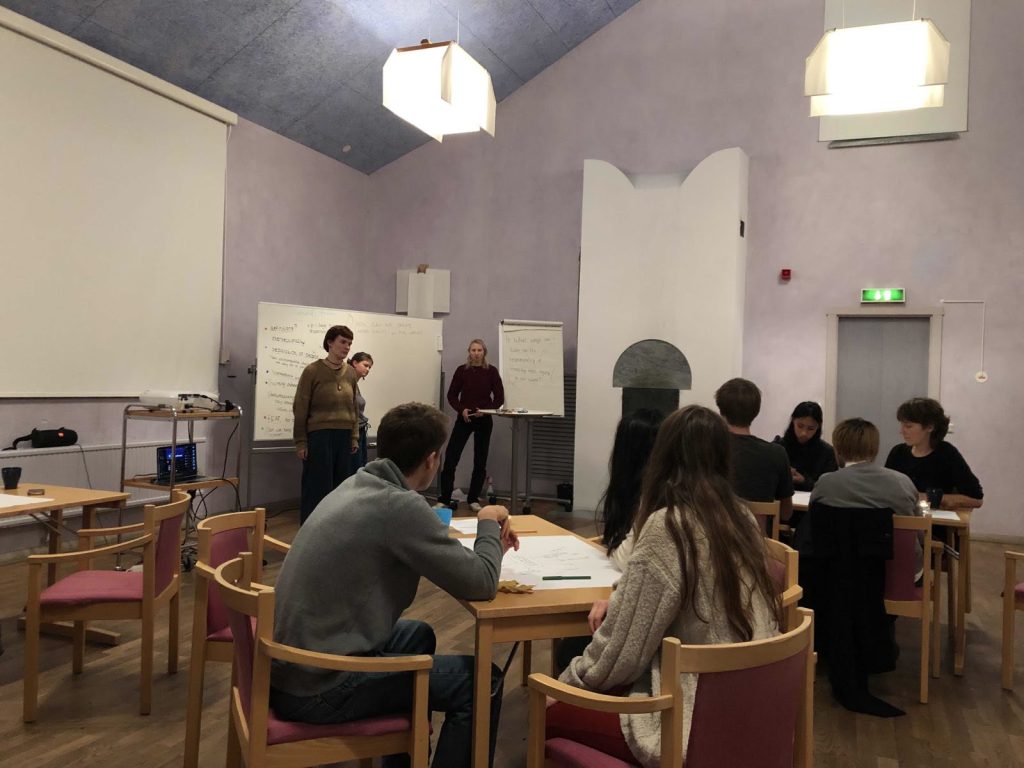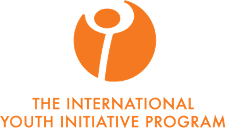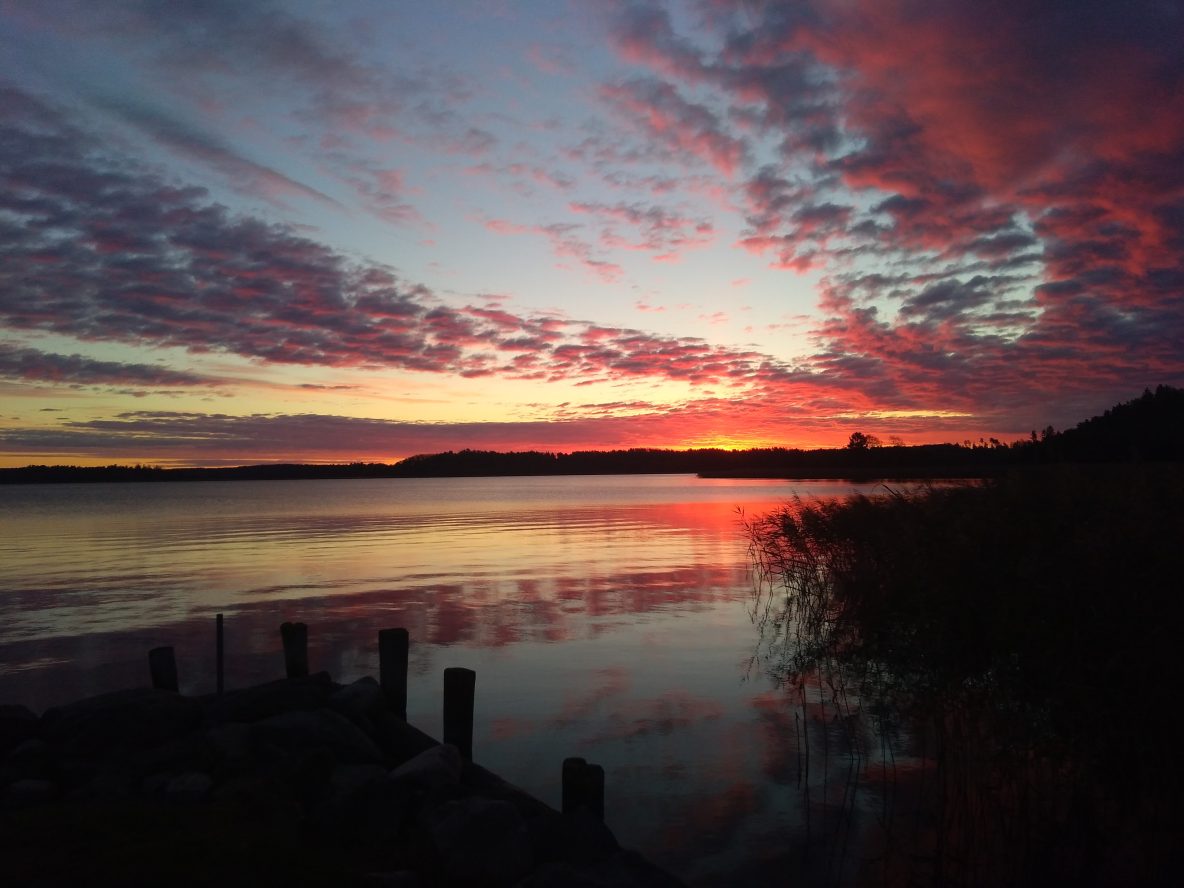Greetings from Ytterjärna where the autumn presented itself in the most beautiful colors during the last weeks. Incredible sunrises, frosty mornings, clear-night skies and shorter days allowed us to enjoy the last bits of this season.
Whilst nature is indicating a shift, we also experienced the last courses of the Global Realities. The week before the autumn holidays we wrapped up the Global Realities block and spent some days Imagining the Initiative Festival 2022. After a well-deserved break, we will be moving with big steps into the Inner Awareness block.
In this newsletter you will find:
- An article from Marlene about her experience of the course week – Living Organisms: Biomes & Paradigms with The Art of Hosting team.
- Lia and Simon will summarize the week with Théo Fischer and Stacco Troncoso on the topic of Values and Economics.
- May will share insights of the course – Beyond Narratives: War and Conflict with Christanne Aikins and Ramsey Boley.
- On the week of Power, Privilege and Oppression with Didi Ntsie, Esmée Begemann, Lina Ashour and Michael Chiunda you can read an impression from Emma.
- Lastly, Iren writes about the course Being Human in a Technological Age contributed by Nicanor Perlas, Elias Romualdez and Orland Bishop.
Love, Pauline
Living Organisms: Biomes & Paradigms
One of the most inspiring weeks for sure, was: “Living organisms: Biomes and Paradigms”. A full week on the Art of Hosting and more. This week, seven contributors visited us and enriched us with their knowledge. In contrast to the previous week, it was much more active and we were all included in the action. On the last two days, we were even allowed to slip into the role of the host ourselves and lead part of the day. This was extremely exciting and a lot of fun for most of us, despite the long and intense preparations that go along with hosting.
Basically, Art of Hosting is built on three different aspects: Hosting, Harvesting and Organizing. The hosting part includes different methods, among those (which we got to know): Fish Bowl, Meta Harvest, A.I Story Trios, Open space Technology, Check in/out, Circle. These methodologies help to create a good and supportive environment in which conversations, discussions and exchange can take place.
Harvesting can also be done in several ways. In our case, it was always about sharing the knowledge of the previous day, briefly and to the point. Among other things, this can be done through a simple mind map, a poem, a word search, a performance… And therefore, in order to then be able to organize something, you can be guided by a certain concept. The so-called: Chaordic stepping stones principle. In doing so, one observes the following nine steps and if these are fulfilled, nothing can actually stand in your way. We were also introduced to several other principles, patterns and techniques of the Art of Hosting. How the different roles in the A.I Stories: Listener, Storyteller and Harvester are connected and cooperate with each other. The 4-folding Practice, 4 Levels of Listening, the Chaordic Path, Diverge/Converge Leadership, Powerful Questions, Storytelling and many fun games in between. Please google and research about all this stuff yourself, really interesting and exciting!
Apart from the course and the world café on Thursday, during Lunch and Fika-breaks we had several inspiring and nice conversations about how to interpret and adapt all these many different concepts and principles in our daily life, meetings, and conversations. And for me personally the course once even accompanied me until 10:00 in the evening, because I was supposed to host an open space the next day, you only realize how much time something like that takes, if you have to do it yourself. But in any case, that was one among many essential experiences.
So all in all, an incredibly great and enriching week!
By Marlene Likar
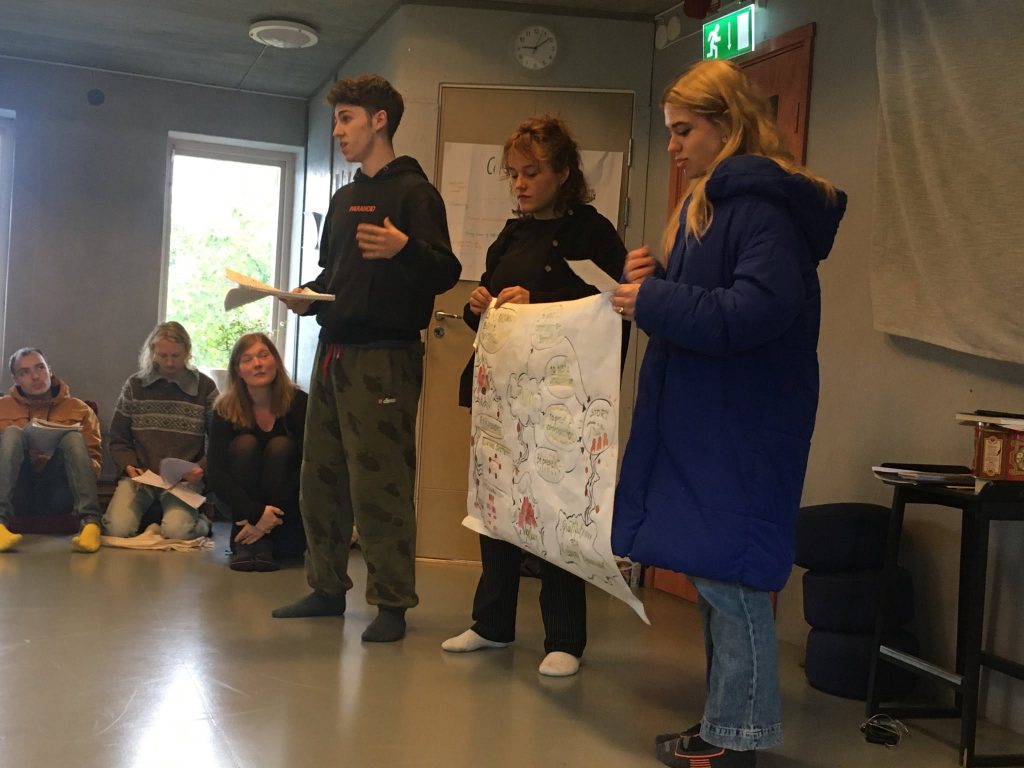
Theo, Stacco, and the Magical World of DisCO’s
We would like to tell a story about the world we live in. We would like to tell the story of the way most of the world’s economy is organized: CAPITALISM: Some love it, some don’t even realize it exists and take it for granted, others see it as the root of all evil and use insults like: shit capitalist, capitalist pig, etc.
Whatever your beliefs about it are, it is very probable that when you’re reading this, you are in some way being part of a “capitalist system”. In the week on values and economics we dove into the history of economy, money and capitalism. All the way from the beautiful shores of Lac Léman, the charmant Théo Fischer came to play a game with us: Thumb Wrestling! Wanna join?
Alright, invite someone around you for a good old session of thumb wrestling. Everytime that you push down the thumb of your partner, you make a point. Now, in one minute, try to make as many points as you can. READY??? GO!!!
Yes, are you done? How did it go? How many points did you make? 3,4,5, more? Most of us didn’t come further than 5. Only one team reached the astonishing number of 40 points? HOW? we asked…
“Well, one of us put down our thumb, and the other tapped 20 times, then we turned it around and made another 20 times.” they explained. Wow, indeed! How could we not have thought of such a simple way of making points?
Théo didn’t instruct us to beat our “opponents”, to make points only for ourselves. Still, 16 out of 17 teams automatically went into that mode of competition. How deep an insight about ourselves and how great a revelation that was about our whole system. If we can actually create way more value by working together, why are we so programmed to compete, fight, and try to take for our own?
Economy is an amalgamation of the Greek words Oikos (=house) & Nomos (=rule/law). We could look at the economy as thinking of how to find balance in organizing a household.
Widening this perspective gives rise to the question of “how do we organize society in the sense of a general common good?” Théo explained to us many ways in which the current capitalist system that shapes our reality is not as logical as we thought it is. It is not anymore about taking care. It is about winning, beating and gaining as much money as one can, in order to “live a good life”.
There were many questions in our minds. “How can we move within this system?” “How can I support myself in a way that doesn’t harm the world?” “Should we stop using money altogether?” Then Stacco stepped out of the big black hole that Théo created for us. Stacco Troncoso (describing himself as “an avid synthesizer of information and a radical polymath working towards elemental, people-led change on a burning planet”) joined us and shared with us the genius concept of DisCO’s: a radical new way of creating organizations that are democratic, inclusive, care taking and responsible. DisCO is basically a concept of organizing ideas and visions with a healthy community in a holistic way. For a more detailed explanation, you should really check out the website: https://disco.coop, because trying to explain it within the limited space of this newsletter wouldn’t do justice to Stacco’s amazing ideas.
In short: What a revelation and inspiration it was to get to know of a way of creating businesses that can both work in the current system and at the same time change that system! We were invited to go in groups and create our own DisCO’s. Amazing plans were created. Cafés, Bookstores, Healing Communities on Islands… It felt that we were given a key of gold. The framework of DisCO’s showed us a way that we can really become social, sustainable entrepreneurs and create a new world, rooted in the current one. For the world that you dream of, what DisCO would you create?
By Lia Gönner & Simon Bauke
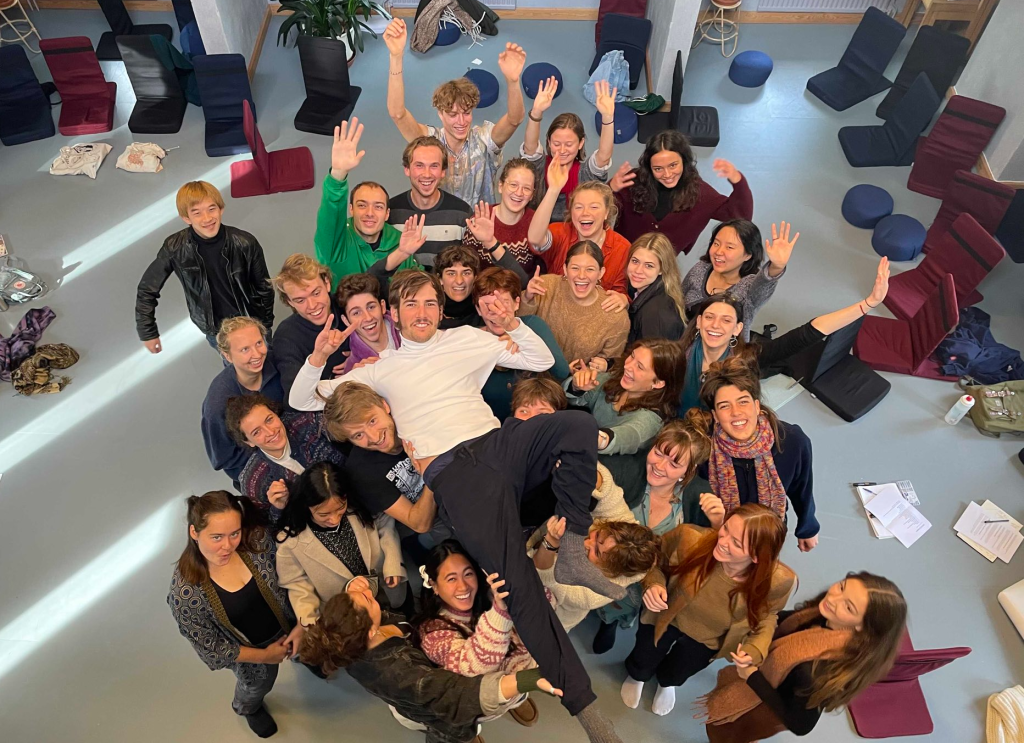
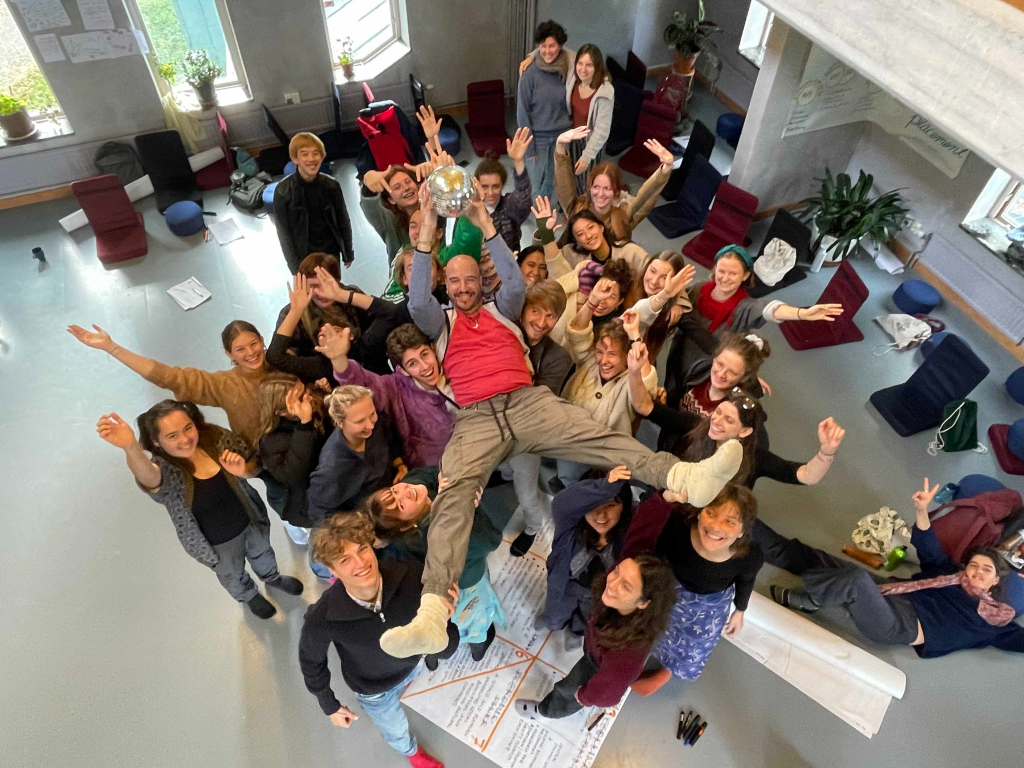
Beyond Narratives: War & Conflict
War. Destruction, violence, emotions, power, money, privilege, corruption, resources, refugees.
Why does war exist?
How can we talk about war without losing hope?
What role does the media play in the narrative about war?
Who gains from war and who is involved in it?
These are some of the questions that moved us as Christianne, our contributor of the week, carried us through this heavy topic with a surprising lightness.
“Why should we care about war in other countries?” she asked us. There are two sides of caring – we can care because we have compassion and empathy, or because of justice, because it should be a human right to live in freedom and to have access to food, shelter and safety.
The media focuses mainly on compassion. We see photos of starving children and injured people in the news. This is a reality of war that we have to be aware of, but focusing only on this perspective diverts from the fact that life is a human right and war demands the death of countless innocents.
Do we care because of our emotions or because of our feeling of righteousness? We concluded that it should be a balance between both.
Christianne led us through the process and history of the war in Afghanistan, which demonstrates the complexity and chaos that culminates in war. Imperialism, Islamophobia and Orientalism are terms we encounter that are important to understand the conflicts in Afghanistan.
Conflict. Misunderstandings, differences, repetitions, discomfort, emotions.
Learning, growth, communication, opportunity, necessesity, process.
In the second half of the week we turned inwards, to conflict on a personal level, guided by Ramsey.
Having lived in a community of 30 people for over a month at YIP, this topic was right on time. The phase of getting to know one another is now over and mild tensions and arguments are rising to the surface. So we have begun using the methods of resolving conflict that we learned in this course into direct practice.
We had time to reflect on our personal conflicts and how we deal with them. Do I tend to avoid conflicts? Do I try to compromise? Do I push my needs above the wishes of the other or do I take myself back and let the other go first?
We discussed the differences between sympathy, compassion and empathy. While sympathy is more superficial, compassion is feeling for someone and empathy is feeling with someone. Sympathy is on a more superficial level and can encompass judgment and pity. While the others are more vulnerable, because you allow yourself to feel the emotions of the other person.
After this course we were left with more questions than we had in the beginning, like every week. And while we are still digesting all the information, next Monday arrives with a new topic to open up a whole new universe of questions.
By May Wyss
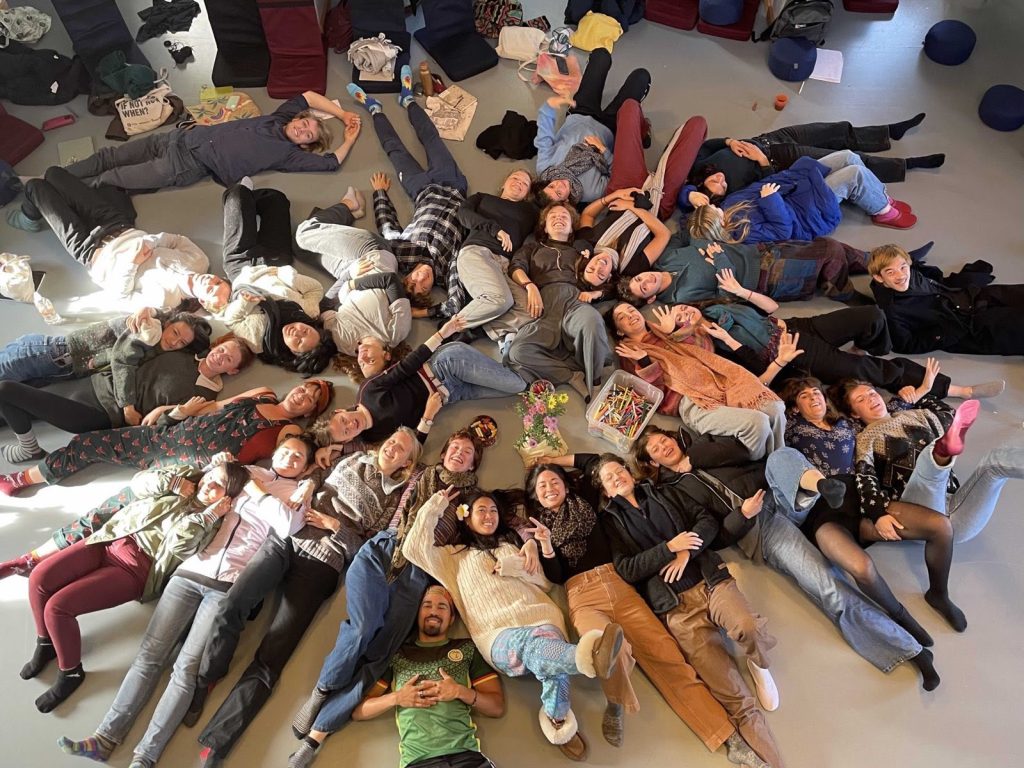
Power, Privilege and Oppression with Didi Ntsie
The week on power, privilege and oppression was, next to the art of hosting, my favorite week so far. It was also the most uncomfortable one. It was a very personal week for everybody. I hope everyone who reads this, realizes that this is the week in my experience and everybody in our group probably had very different experiences.
Our contributor was Didintle, who was joining us online and had separate video calls with some Yippies. She was super nice and very open to all questions, even the uncomfortable ones. I really enjoyed learning from her and being in conversation with her. She had a lot of in person help from three Yippies from previous years, Esmée, Lina and Michael. They helped us a lot in the process and we did some fun warm ups everyday (thanks Esmée!). We started the week with labeling certain things I had never even heard of. Things like xenophobia (prejudice against people from other countries) and allosexuality (anyone who feels sexual attraction to other people). This showed me that there is a lot I don’t know, I don’t know, and I would like to shift those things into knowing that I don’t know them or even just knowing them. Sounds confusing right? It was.
On the second day we played a ‘game’ in which it became very clear where we hold privilege and where we don’t. I think I can say it was quite astonishing to see where we ended up on the line of privilege for all of us. I was convinced I would be somewhere in the front of privilege, being white, European and educated, but found that there are people that feel safe walking alone at night and I don’t. Not having certain privileges doesn’t mean that you know how all marginalized groups feel. I know what it feels like to be a woman, but I don’t know what it feels like to be a person with a disability within our society. In the remaining days, we had a lot of conversations on what to do with the privilege that one holds and where to call out and where to call in. How can one be an active ally? What can you do, with your privilege, to fight racism? How can I educate myself without expecting other people to do it for me? What are microaggressions (things we say without realizing it makes other people feel uncomfortable) I see and in what ways am I micro aggressive? These are all questions we worked on and tried to answer. I think I found some answers and some things shifted into the knowing, some things shifted in the knowing that I don’t know and some things I will educate myself on. There are a lot of books, podcasts and movies out there and I would suggest everybody to take a look at what is out there, inform yourself and to be an active ally in the fight for social justice.
By Emma Wulterkens
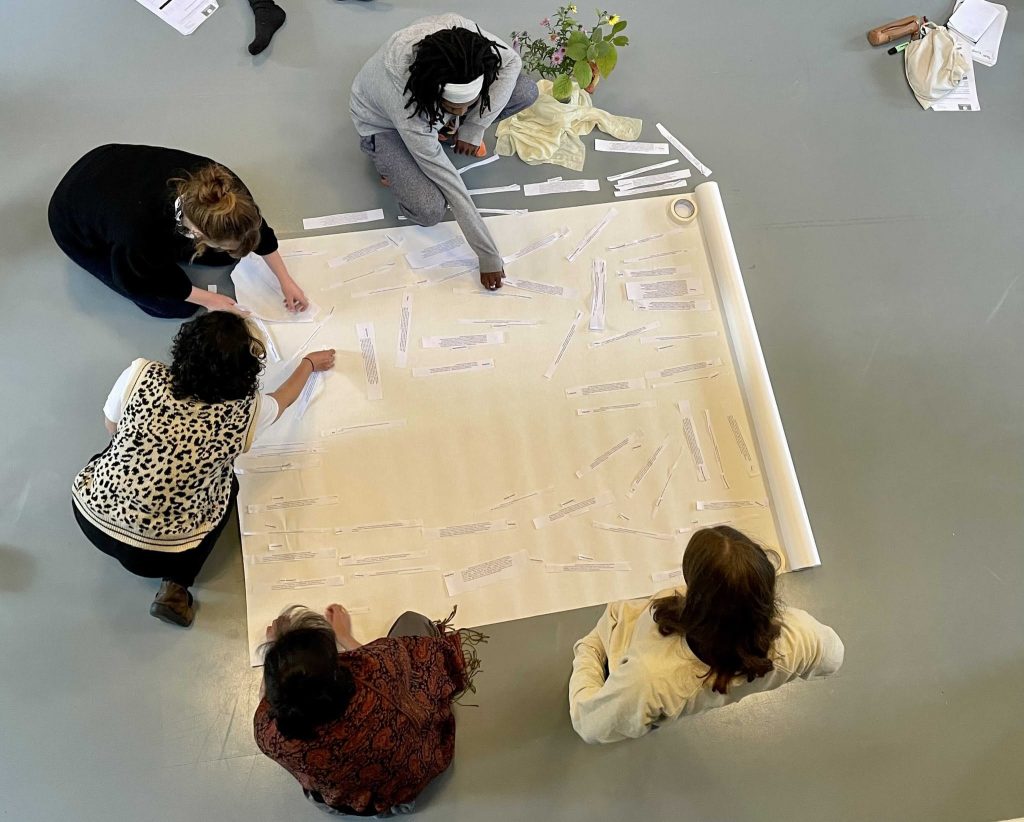
Being Human in a Technological Age
We started the week with a talk from Nicanor Perlas, Filipino environmental and social activist and 2003 recipient of the Right Livelihood Award. He brought us a slightly unexpected alternative view on Covid19, which some found difficult and triggering and others found familiar and chilling. However, this has started many conversations about the current global reality and inspired much diligent research. We were made aware, once again, of the reality that the thirty-five of us are simply a microcosm of the world.
Tuesday brought us an excellent video¹ from Dr. Gopi Krishna Vijaya on the history and future of technology. His thesis was that early technology is the outsourcing of physical systems and organs of the human body. For example, the steam engine utilizes the inward and outward flow of air, breathing in and out, alternating suction and pressure. Electricity was discovered in the nervous systems of electric fish. Telescopes and microscopes are eyes, expressed in microcosm and macrocosm. But we finished expressing all the functions of the human body in the 20th century, and in the 21st, we have begun outsourcing the human consciousness into digital technology.
We gathered questions that we had about the amorphous subject of technology: Whose values are we coding into artificial intelligence? Can AI ever be truly creative or will it simply remix its source code and parameters forever? What are artificial wombs and how could they work? What part of the human consciousness does our current digital technology express? We were then given time to do our own research in small groups by topic of interest.
Wednesday brought Elias Romualdez, facilitator and technology scholar, contributing live online from the Philippines. He asked us to consider our concerns regarding technology, of which we had many. The next few days with him gave us a holistic understanding of the current paradigm in technology: attention has become the most valuable commodity in the world.
On Thursday, Elias asked us to become aware of our thinking. “Think about thinking,” he said. Most of our minds were blank. “Now think about yourself thinking.” That, we were capable of. “Thinking is like light. We cannot behold light, we only behold that which it touches. We see its result but not its origin.”
He brought us through a holistic and detailed history of the dominant historical paradigm that shaped current technological development, the three main characteristics of which are scientific reductionism/materialism, war and colonialism, and predatory free-market capitalism. These gave rise to the current impulses within technology today: the threefold gesture of the digitization of matter, digitization of conscious, lived experience, and the externalization and substitution of human faculties. All of this leads to the mechanization of Society, Nature, and Self.
Thursday left us with a lot of questions and concerns about the future. To inspire and encourage us, Elias brought us good news on Friday morning. Many people are fighting for fair data use laws. The tech sector is receiving worldwide pushback for its predatory and health-disrupting algorithms and applications. There is a huge and enthusiastic push for decentralization, a key part of participatory democracy. Elias introduced us to the Solarpunk movement, an art movement that imagines a future living in harmony with both nature and technology. He closed with a question to us: What capacities do we need to grow in order to create and live in a healthy world?
After fika on Friday, we were joined by Orland Bishop, which was an incredible honor. For the hour and a half that he spent with us, we sat in rapt silence. I have four pages of haphazardly scribbled notes, mostly broken sentences, which feel somehow too sacred to share through the ones and zeros of the internet. The entire group experienced what I can only describe as magic. I will only express that we all were filled with love, wonder, and a fiery pride in being human. Cultivate that inner fire of love, said Orland, the only love that transforms instead of destroys.
YIP14 is immensely grateful to our wonderful Organizing Team, who navigated a lot of uncertainty with grace as contributors changed and real-world topics spawned difficult conversations. They are each individually examples of the personal capacities needed to create a healthy culture in the world, and a week that started with a lot of shock ended in transformation and understanding.
Footnote:
1. Watch The History of Technology by Dr. Gopi Krishna Vijaya, Moral Technologies Conference 2018 here:https://www.youtube.com/watch?v=H-LZa_xtTbw&ab_channel=MoralTechnologies
By Iren Barnum
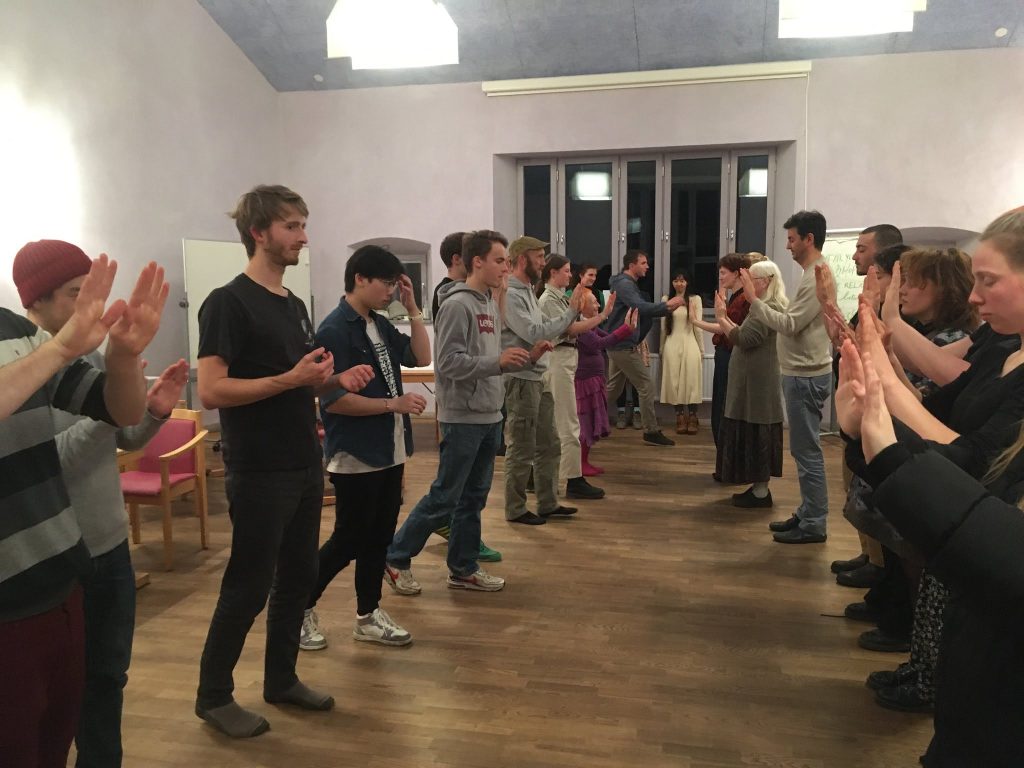
World Cafés
For the last 7 weeks, every Thursday evening we had a world cafe. The contributor that was hosting the course would give a lecture, tell a story or we would show a pre-recorded video if we had an online contributor. A few yippies would come together and with help from the team they would organize and host the evening. A world cafe is a very interesting and effective way of diving deeper into a subject and learning from each other through discussion. It’s a great way to hear different opinions on nuanced topics and practice listening more deeply. For the yippies it was a nice opportunity to hear about the topics in a different setting. The world cafes took place in the Kulturhuset. Sometimes we held them downstairs in a more formal setting, other times upstairs in a more cozy and intimate setting. We made hot tea and sometimes baked cookies or cake to share with the participants.
A mix of Yippies and locals attended. Visitors of the campus, random people we plucked off the street, and people who live in Järna familiar with YIP. I really liked seeing unfamiliar faces and hearing more diverse opinions about the topics we learned about during our courses. And it was also a way to network and make connections with communities in the neighbourhood. The night always started with an introduction, a summary of the week, sometimes we sang together or did a fun energizer. After that, the hosts would introduce the principles of the world cafe.
1: speak from experience
2: listen to learn
3: connect themes and ideas
4: doodle and draw
Then the contributor would present their lecture or story, after which the participants would discuss, guided by specific questions and facilitated by the hosts. At the end of the world cafe we would harvest all of the things that people came up with. It was so interesting to hear everyone’s different views and opinions and I always felt inspired after the world cafe ended. I was a bit hesitant at first about hosting an event like this, because we don’t have a lot of time during the week, so I knew it was going to be a bit stressful. Nevertheless I didn’t want to miss the opportunity to learn how to host a whole group of people in this context. It was really nice to be coached by Isabel because she encouraged us to figure out stuff ourselves instead of asking people to do it for us. When the night was over I felt amazed about the fact that without any experience we were able to host such a nice evening.
By Sara Van Dongen
Reflections from other yippies:
Iren:
It was so lovely to see my fellow Yippies step into hosting and to host a world cafe myself. Each lecture and discussion felt like a tiny microcosm of the real world of social change. We developed listening and discussion capacities in practice and connected with some of the local people over important issues.
Liam:
I think Iren enjoyed the world Cafes because she won’t stop talking about them. They were pretty cool I guess but I don’t have a strong opinion about how they relate to her. Kind of a strange question don’t you think? Why would I need to describe her view when she’s right there?
May:
Hosting the world cafe was a lot of work, but hearing the reflections on the questions people had was very fulfilling.
Fynn:
I find the concept of the world cafe at yip an extremely good way to not only allow the participants to process the information they receive, but also to include the surrounding community into the learning that happens at yip. It is a good project and should be continued.
Dajin:
It was really interesting to see that all the world cafes had different atmospheres depending on who was hosting and who was contributing. It was a wonderful space to learn, but also share and collaborate with a variety of ideas.
Tessa:
The world cafes also provided a nice opportunity for us to practice our hosting and presenting skills and to connect to locals.
